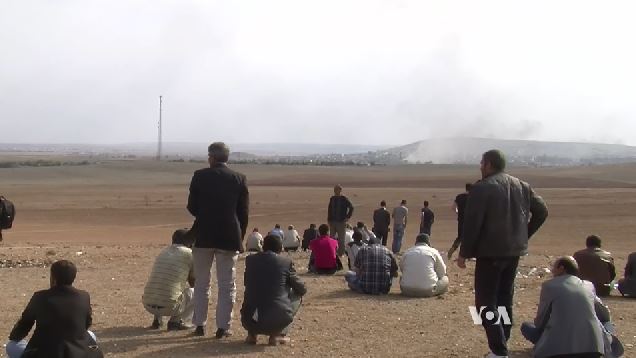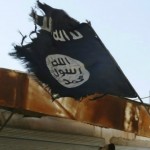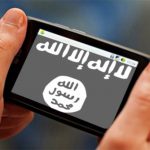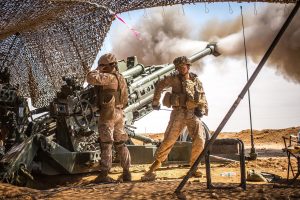by Wayne White
Defenders of the Syrian Kurdish city of Kobani (or Ayn al-Arab) have fought valiantly against heavily armed Islamic State (IS) forces for three weeks with only light arms. Until late on Oct. 7, Washington did relatively little but watch a major contingent of the only effective “boots on the ground” against IS being driven slowly back into their city. Turkey has done less than nothing, triggering domestic protests. Meanwhile, stumbling, less determined Iraqi Army units recently lost key territory to IS despite intense American air support.
The leftist anti-Turkish politics of the Syrian Democratic Union Party (PYD or YPD), its connection to the terrorist Kurdistan Workers Party (PKK), and an iffy Syrian Kurdish alliance of convenience with the Syrian regime against IS may have trumped military wisdom, leaving potentially 2 million Syrian Kurds to bear the full fury of IS mostly alone. Perhaps Ankara expressed early on a preference that Kobani’s defenders receive little US air support, hoping IS might degrade a longstanding thorn in Turkey’s side.
If Turkish President Recep Tayyip Erdogan harbored such sentiments, time has not been kind to him. The international media dramatized the heroic Kurdish stand at Kobani, and Turkey’s large Kurdish population—not just Syrian Kurdish refugees—have become increasingly outraged. Yet although armed with new legislation authorizing him to take military action, Erdogan has remained passive—not even responding to IS artillery and mortar rounds falling inside Turkey (and wounding several Turkish civilians). He also made the mistake of saying publicly on Oct. 7 that airstrikes would not save Kobani, which was “about to fall.”
It’s therefore no surprise that angry Kurdish demonstrators have taken to the streets in cities across Turkey, with authorities responding with tear gas, water cannon, and baton beatings. Eighteen protesters had been killed by Oct. 8. Denying Kobani assistance (such as blocking Turkish Kurds from as far away as Istanbul from joining the fight) threatens to undermine longstanding Turkish efforts to address the Kurdish issue at home and abroad in a conciliatory manner. Indeed, the Turkish-PKK peace process advanced by Erdogan personally could be in real jeopardy.
Shallow Excuses
Meanwhile, in response to increasing domestic criticism over relative US inaction concerning Kobani’s plight, the Pentagon provided questionable excuses for its failure to assist Kobani.
CNN reported on Oct. 6 that, according to US defense officials, air support was largely withheld from Kobani because guided munitions might stray into Turkey, and that the US mission in Syria did not include providing such support. On Oct. 7, a Pentagon source said since IS fighters have entered Kobani, they are difficult to target, and that supporting the fighters in Kobani was inconsistent with what was claimed to be an “Iraq first” policy.
In fact, the advanced guided munitions in use now are quite capable of hitting targets with an error margin measured in yards, not many hundreds of yards—or even kilometers—from the Turkish border. This also suggests that the US mission in Syria to “degrade and destroy” the Islamic State is so tactically rigid that ignoring IS tanks, artillery, heavy mortars, dug-in combatants, and sizeable groups of fighters in the open around Kobani has been acceptable.
Moreover, arguing now that hitting IS fighters besieging Kobani is difficult because they are in the city only begs the question as to why those many vehicles, weapons and IS fighters were not attacked when they were fully exposed. For much of the battle for Kobani, whether or not an Iraq strategy was the priority, there was perhaps no situation in Iraq either so desperate or target-rich as the Kobani sector. And the US did show considerable flexibility in its “Iraq first” strategy to divert massive aerial firepower to strike IS oil refineries, headquarters, and barracks concentrated in Syria.
One senior US official has told the New York Times that there is “growing angst about Turkey dragging its feet…to prevent a massacre less than a mile from its border.” It is no surprise that Gen. John Allen, Washington’s point man for the anti-IS coalition, is going to be in Ankara later this week, and Secretary of State John Kerry telephoned Turkish Prime Minister Ahmet Davutoglu on Oct. 6th and 7th.
With mounting pressure on Washington, US air strikes did begin hitting IS assets to great effect close to Kobani during the night of Oct. 6-7. Previous sporadic American airstrikes had found it difficult to hit IS much at all around Kobani (striking abandoned positions, for example). Suddenly, however—even with IS not only far closer to, but inside Kobani—US airstrikes have scored direct hits, despite prior Pentagon excuses. Twenty IS positions have been hit since Monday, and strikes reportedly have forced IS fighters back to the edge of Kobani.
Calling all “Boots on the Ground”
It will hopefully dawn on American policymakers that assigning little priority to aiding forces facing off gamely against IS around Kobani might enable the group to sweep from the field the only indigenous force now seemingly capable of putting up truly determined resistance against the Islamic State. While the Iraqi Army, Iraqi Kurdish Peshmerga, and the Free Syrian Army whine about not having enough heavy weapons, typically advancing only behind a curtain of US airpower, and even then—around and west of Baghdad of late—still losing vital terrain, YPG fighters stood their ground with what little they had.
In a large battlefield spanning two countries and otherwise bereft of tough anti-IS cadres, allowing Syria’s Kurds to go under could very well be viewed in retrospect as the worst military blunder of this particular US air campaign.
Moreover, sweeping IS lunges into Syrian Kurdistan could set the stage for this brutal group’s most gruesome bloodbath. This would be the Islamic State’s first conquest of a non-Arab, largely secular population. Already committing widespread atrocities in Sunni Arab areas, there is no telling what could happen in Syrian Kurdistan, but Sinjar might provide a foretaste.
*Wayne White served as a peacekeeper in the Sinai with the Egyptian & Israeli armies, and authored hundreds of pieces of military analysis plus major sections of it for National Intelligence Estimates during 1979-2005.






Nothing is as it appears.
Ron, you are correct and things aren’t as they appear!
ISIS was created and trained in Iraq as a proxy force to do the dirty work in Syria! Now ISIS, of course WITH PERMISSION, is taking over Syria a bit at the time without any external resistance! The idea is for ISIS to take over Syria eventually, force Assad to abdicate his power and leave his country! Once ISIS IS ESTABLISHED it’s government in Syria, then ISIS will attack Lebenan and will take care of Hezbollah! This is not a bad and inexpensive short term plan to kill 2 birds with one shot and get rid of 2 Shiite establishments one in Syria and another in Lebenan that are geographically close to Israel! Ultimately the destruction of Syrian regime and Hezbollah will weaken Iran’s position in its regional and international negotiations! That is kind of the third bird hit with same shot!!! However, the bigger question is going to be how the world is going to be managing a ruthless gang such as ISIS in the future when it had become so powerful with armors it’d captured from the current Syrian government and Hezbollah??
So ISIS is an Israeli proxy army fighting IRAN?.That explains everything.The problem is who is going to confront the humvees and ISIL after the zionist mission is acomplished.Leave it to the brotherhood to rehabilitate them and turn them into jihad light.Saudis,Qatar,Turkey created ISIS and miscalculated and now are witout a good strategy to manage the problem..They had political and economic reasons and created new problems in addition to the existing Iranian threat.
The U.S. is downplaying the importance of ISIS taking Kobani yet U.S. airstrikes are now having a substantial effect on ISIS forces in and near Kobani. The U.S. may not want to supply them with heavier weapons because they don’t want to cause a conflict with Turkey which is concerned that the Kurds may use them against Turkey in the future. However if the U.S. wants to help prevent the fall of Kobani why doesn’t it at least supply the Kurds in Kobani with ammunition and anti-tank weapons?
Kobani doesn’t Need any Boot on Ground!!! what they need is Simple!!! ISIS has most Modern American Weapon that they Captured from Iraqi Army!!! what now in Kobani is Happening, is an unfair Battle. what Kobani needs now is Defense Weapon!!! how can with AK go Battle with Modern American Tank!!!! its Just Not Fair!!!!!While the Hole World Watching Live on TV, how ISIS Killing those who Defend there hometown!!!! and Turkey’s Army Got First Seat to Watch and Giving ISIS Intelligence first hand !!! While the ISIS regrouping and gathering more fighters from Turkey , Kobani is Surrounded and can Not do that!!!!! you Tell me what is Going on??????
and don’t Forget!!! all the Muslims From all Around the World see Kurd ans Evil and Satan!!! because there Women is not wearing scarf!!!! the Kurds are Doomed!!!